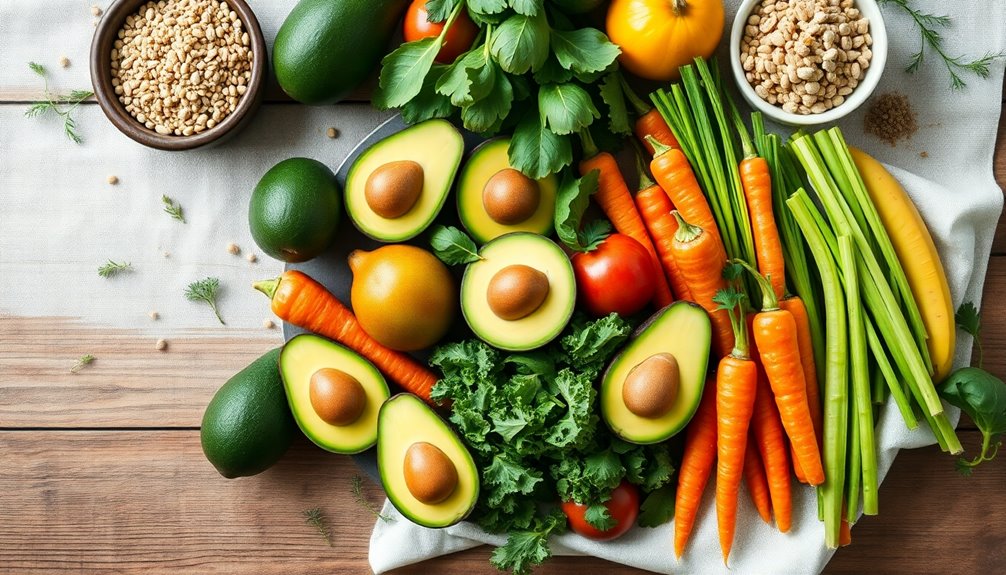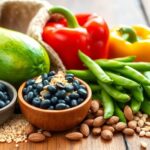Beginning a vegan lifestyle involves adopting plant-based foods while making ethical and health-conscious decisions. You'll reap the advantages of a range of nutrients present in legumes, vegetables, and grains, which can help reduce the risk of long-term illnesses. Remember to consider essential nutrients such as vitamin B12, iron, and zinc—combining them with foods high in vitamin C can enhance absorption. Ease into this lifestyle change gradually, establish a support system, and experiment with a variety of recipes to keep meal times interesting. The positive effects on your well-being and the planet can be profound. Stay tuned for more valuable insights to assist you on your vegan journey.
Key Takeaways
- Understand the core principles of veganism, including abstaining from all animal products for ethical and environmental reasons.
- Familiarize yourself with essential nutrients like protein, vitamin B12, iron, and zinc to maintain a balanced diet.
- Build a support system by connecting with like-minded individuals and joining online or local vegan communities.
- Explore diverse recipes and food substitutes to keep your meals exciting and satisfying while transitioning to a vegan diet.
- Educate yourself about the health benefits of a vegan diet, which can reduce chronic disease risks and enhance overall well-being.
Understanding Veganism
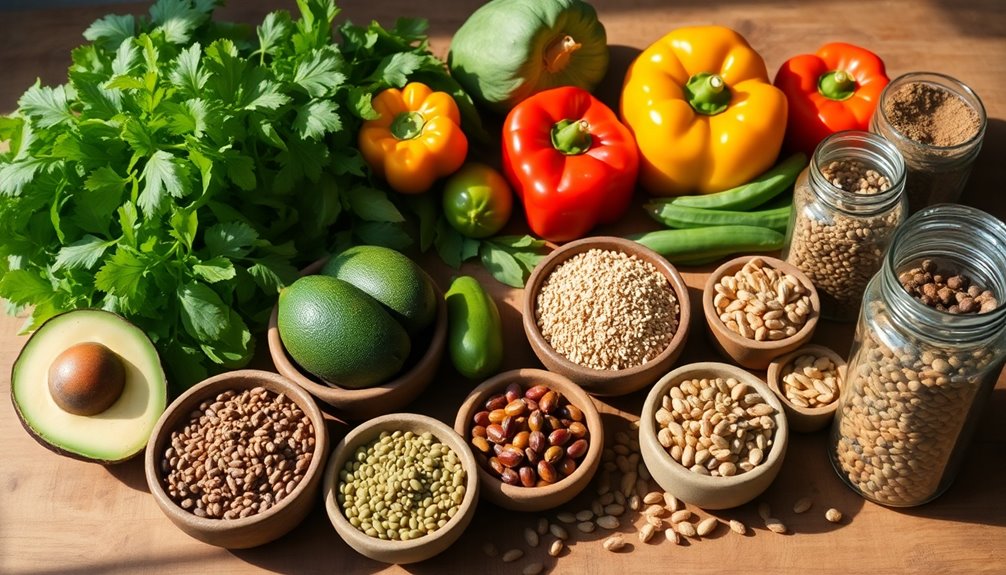
Understanding veganism starts with recognizing its core principle: abstaining from all animal products. This commitment goes beyond dietary choices; it reflects a lifestyle focused on compassion, ethics, and sustainability.
Many people engage in the ethics debate surrounding animal rights, questioning whether it's morally acceptable to exploit animals for food, clothing, or entertainment. By choosing veganism, you align your actions with a belief system that prioritizes the well-being of all sentient beings.
Additionally, the environmental impact of animal agriculture can't be ignored. Studies reveal that livestock farming contributes significantly to greenhouse gas emissions, deforestation, and water pollution. By adopting a vegan diet, you actively reduce your carbon footprint and help combat climate change. You're not just making a personal choice; you're participating in a larger movement that addresses crucial global issues.
Moreover, embracing veganism fosters a sense of belonging within a community that values ethical living. You'll find support and inspiration from like-minded individuals who share your commitment to animal rights and environmental sustainability. Whether through local meetups, online forums, or social media groups, connecting with others can enhance your journey.
As you explore veganism, remember that it's about making informed choices that reflect your values. This journey may challenge your beliefs and habits, but it also offers an opportunity for personal growth and a deeper understanding of your impact on the world. Embrace the chance to contribute to a more compassionate and sustainable future.
Health Benefits of Vegan Diet
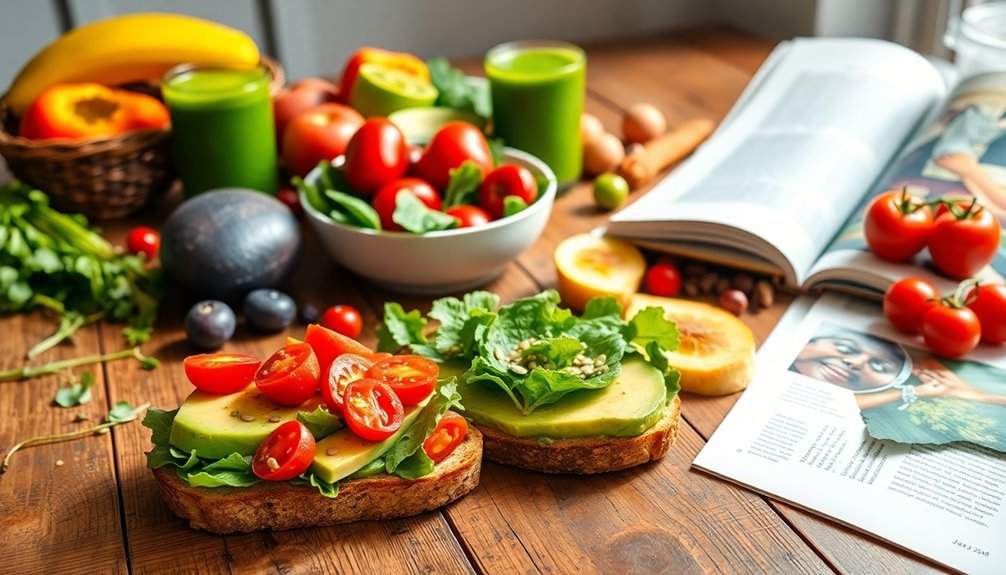
Choosing a vegan diet not only aligns with ethical and environmental values but also offers a wealth of health benefits. By embracing plant-based foods, you can achieve a nutritional balance that supports your overall well-being. A vegan diet typically includes a variety of fruits, vegetables, whole grains, nuts, and seeds, which are packed with essential vitamins, minerals, and antioxidants. This diverse array of foods helps you maintain a healthy weight and achieve peak energy levels.
Research shows that adopting a vegan lifestyle can notably reduce your risk of chronic diseases. Studies indicate that vegans often have lower blood pressure, cholesterol levels, and body mass index (BMI), which are all key factors in disease prevention. A well-planned vegan diet can help combat heart disease, type 2 diabetes, and certain types of cancer. By focusing on fiber-rich plant foods, you're also more likely to improve your digestive health and promote regularity.
Moreover, the anti-inflammatory properties of many plant-based foods can further enhance your immune system, keeping you feeling your best. By choosing a vegan diet, you'll not only nourish your body but also cultivate a sense of community with like-minded individuals who value health and compassion.
Whether you're seeking to improve your health, connect with others, or reduce your environmental footprint, the benefits of going vegan can be both transformative and rewarding. Embrace the journey, and you'll discover a vibrant, healthier you.
Essential Nutrients to Consider
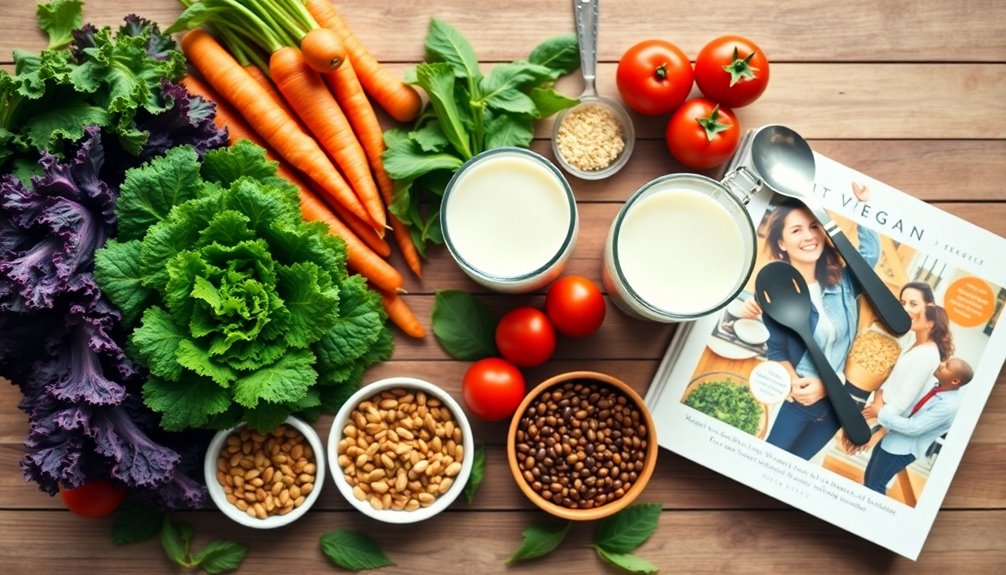
When you switch to a vegan diet, it's essential to pay attention to essential nutrients that can sometimes be lacking in plant-based eating. Understanding these nutrients will help you maintain a balanced and healthy lifestyle. Here are three key nutrients to keep in mind:
- Protein Sources: While many believe that protein is hard to come by in a vegan diet, there are plenty of excellent plant-based protein sources. Legumes, lentils, chickpeas, and quinoa are all fantastic options. Incorporating a variety of these foods can help you meet your protein needs effectively.
- Vitamin B12: This vitamin is vital for nerve function and red blood cell production. Unfortunately, it's primarily found in animal products. To avoid deficiencies, explore fortified foods or a B12 supplement to make sure you're getting enough.
- Iron and Zinc: Plant-based diets can sometimes lead to lower levels of iron and zinc due to the presence of phytates in plant foods, which inhibit absorption. To enhance your intake, focus on legumes, nuts, seeds, and whole grains, and pair them with vitamin C-rich foods to improve absorption.
Common Misconceptions About Veganism
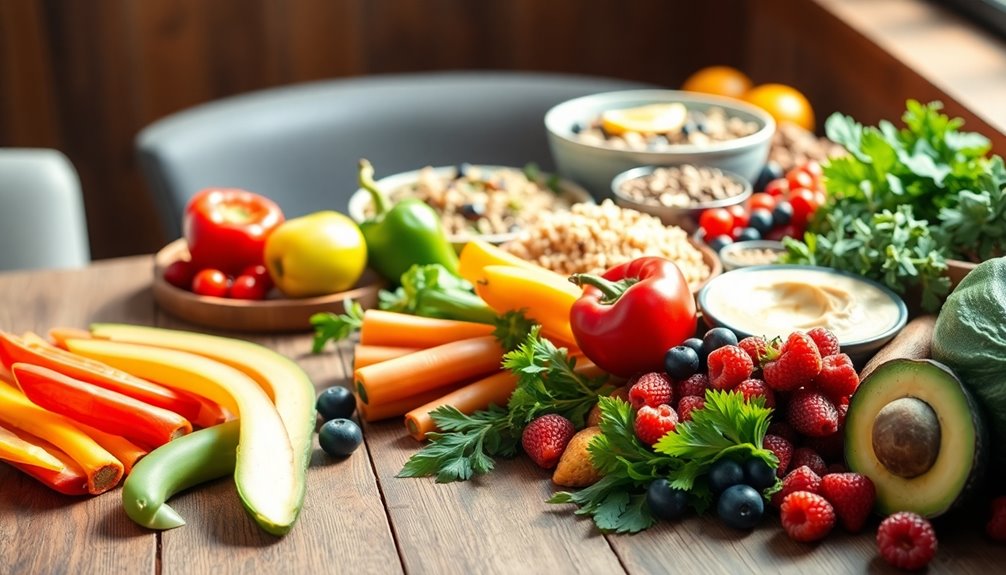
Many people mistakenly believe that a vegan diet is too restrictive or lacks sufficient nutrition. This misconception often stems from common vegan stereotypes, which paint a picture of bland, limited food options. In reality, a well-planned vegan diet can be diverse, delicious, and nutritionally adequate.
Take a look at the table below to see how common food groups provide essential nutrients:
| Food Group | Nutritional Benefits | Vegan Sources |
|---|---|---|
| Legumes | Protein, fiber | Lentils, chickpeas, black beans |
| Whole Grains | Carbohydrates, iron | Quinoa, brown rice, oats |
| Fruits & Vegetables | Vitamins, antioxidants | Berries, kale, sweet potatoes |
| Nuts & Seeds | Healthy fats, protein | Almonds, chia seeds, flaxseeds |
Moreover, many people overlook the positive environmental impact of adopting a vegan lifestyle. Research shows that plant-based diets can greatly reduce greenhouse gas emissions, conserve water, and minimize land use compared to meat-heavy diets. Embracing veganism gives you a chance to contribute to a healthier planet.
Transitioning to a Vegan Diet
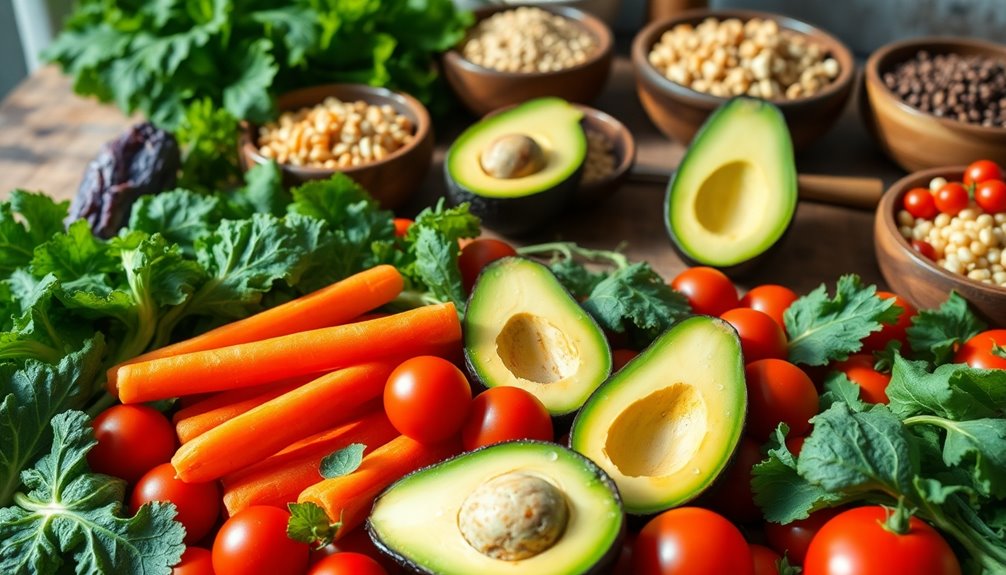
Shifting to a vegan diet can be a rewarding journey, and it's easier than you might think. Many people successfully shift and find that it enhances their health, environment, and ethical beliefs. Here are three key steps to help you get started:
- Build a Support System: Surround yourself with like-minded individuals, whether that's friends, family, or online communities. Having a support system can make a huge difference in staying motivated and inspired.
- Create a Recipe Collection: Gather delicious vegan recipes that excite you. Experimenting with different flavors and ingredients can keep your meals interesting and satisfying. Consider starting with simple dishes that can easily replace your current favorites.
- Educate Yourself: Take the time to learn about plant-based nutrition, including essential nutrients like protein, iron, and B12. Understanding what your body needs can help you feel confident in your choices.
As you start on this shift, remember that it's okay to take small steps. You might begin by incorporating more plant-based meals into your week or dedicating one day to being fully vegan. Every little change counts, and celebrating your progress along the way can boost your commitment.
Embrace the resources available, and don't hesitate to reach out for help. With the right support and a solid recipe collection, you'll find that adopting a vegan lifestyle isn't only achievable but also fulfilling.
Meal Planning Tips
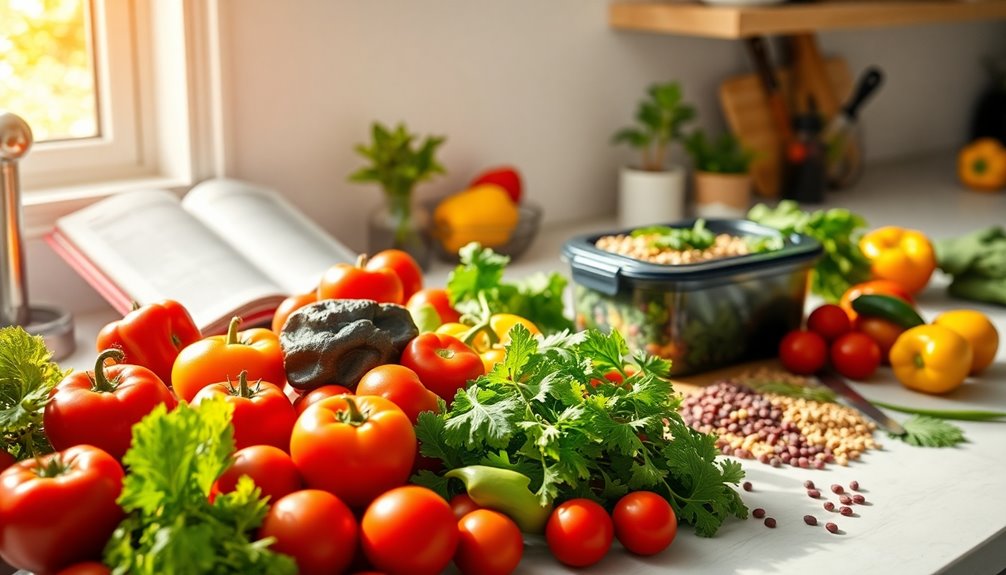
Effective meal planning is a powerful tool for anyone making the switch to a vegan diet. By organizing your meals ahead of time, you can guarantee you're getting all the nutrients your body needs while also saving time and money. Start by creating a weekly meal plan that includes breakfast, lunch, dinner, and snacks. This helps you stay focused and reduces the temptation to reach for non-vegan options.
When grocery shopping, make a detailed list based on your meal plan. Stick to the perimeter of the store where fresh produce, grains, and legumes are typically located. This strategy not only helps you avoid processed foods but also encourages you to try new ingredients and flavors.
For recipe ideas, explore various sources like vegan cookbooks, blogs, and social media platforms. Don't hesitate to join online communities or local groups of fellow vegans; they can provide valuable inspiration and support. Experimenting with diverse cuisines can keep your meals exciting and satisfying.
Batch cooking is another effective strategy. Prepare larger portions of meals you enjoy and store them in the fridge or freezer for quick access throughout the week. This way, you'll always have a healthy option on hand, which can be a lifesaver during busy days.
Vegan Food Substitutes
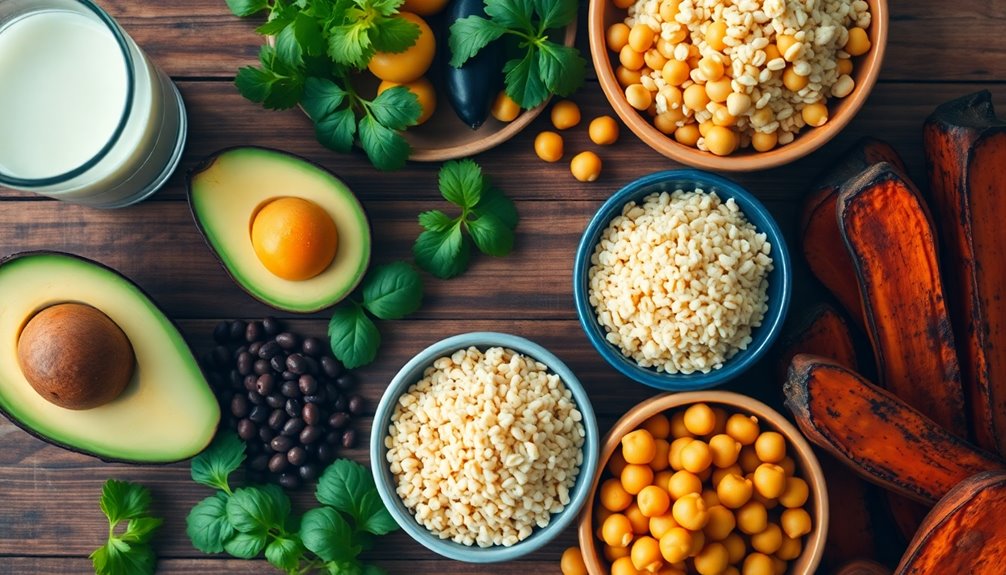
Planning your meals is just the start; knowing how to substitute non-vegan ingredients is key to successfully maintaining a vegan diet. By doing this, you can enjoy your favorite dishes without compromising your values. Here are three essential vegan food substitutes to keep in mind:
- Plant-Based Proteins: Instead of meat, consider using lentils, chickpeas, or tofu. These options aren't only high in protein but also rich in fiber, making them a nutritious choice for your meals.
- Dairy Alternatives: For milk, opt for almond, soy, or oat milk. These dairy alternatives can be used in your morning coffee, smoothies, or baking, providing a creamy texture without the animal products.
- Egg Replacements: If a recipe calls for eggs, try using flaxseed meal or chia seeds mixed with water. This combination works wonders in binding ingredients together and is a great source of omega-3 fatty acids.
Dining Out as a Vegan
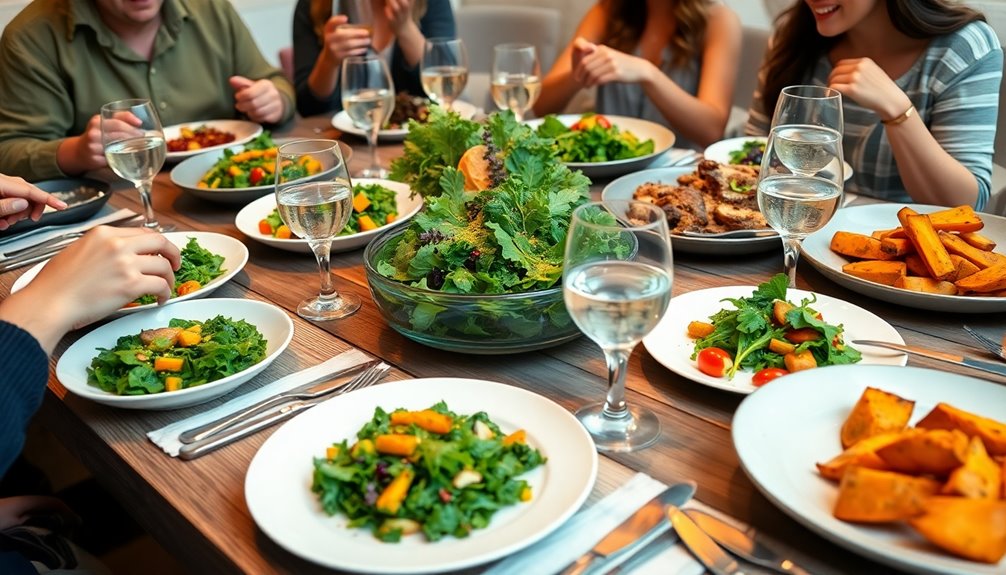
Dining out as a vegan can feel intimidating, but with a bit of preparation, it can be an enjoyable experience. You don't have to miss out on social gatherings or delicious meals. Start by researching vegan-friendly restaurants in your area. Many cities now have eateries dedicated solely to vegan cuisine, and even traditional restaurants often offer plant-based options. Websites and apps can help you locate these spots, making your dining choices easier.
When you arrive at a restaurant, don't hesitate to ask about vegan menu options. Many chefs are happy to accommodate dietary preferences, and some may even modify dishes to suit your needs. It's a good idea to check the menu online before you go, so you can identify items that are naturally vegan or can be made vegan. Look for salads, grain bowls, and pasta dishes that can be customized.
Another tip is to call ahead. If you're planning to dine at a specific place, a quick phone call can provide insights into their vegan offerings. Some restaurants may not advertise their vegan options prominently, but they might've some hidden gems on the menu.
Lastly, don't be afraid to express your dietary preferences when ordering. Many people are opting for plant-based diets today, so you're not alone. With a little preparation and communication, you'll find that dining out as a vegan can lead to delightful discoveries and a sense of belonging in the culinary world.
Resources for Further Learning

Finding reliable resources can greatly enhance your understanding of a vegan diet. Whether you're looking to dive deeper into ethical considerations or explore plant-based recipes, having the right materials at your fingertips can make your journey smoother and more enjoyable. Here are three valuable resources to get you started:
- Books: Look for titles like "How Not to Die" by Dr. Michael Greger, which discusses health benefits and the environmental impact of a vegan lifestyle.
- Online Courses: Websites like Coursera and Udemy offer courses on plant-based nutrition, providing scientific insights and practical tips that can help you navigate your new diet effectively.
- Vegan Community Forums: Engage with platforms like Reddit's r/vegan or Facebook groups dedicated to veganism. These communities offer support, share recipes, and discuss ethical considerations surrounding vegan living.
Joining a vibrant vegan community can foster a sense of belonging and provide you with encouragement as you make the shift. You'll find that many members are enthusiastic to share their experiences and tips, making it easier to adapt to your new lifestyle.
Frequently Asked Questions
Can I Be Vegan and Still Eat Junk Food?
Yes, you can be vegan and still enjoy junk food! Many vegan alternatives exist, like plant-based burgers and dairy-free ice creams. However, maintaining your nutritional balance is crucial. Relying too heavily on processed vegan foods can lead to deficiencies.
Aim to include whole foods like fruits, vegetables, and grains in your diet. This way, you can satisfy your cravings while maintaining a healthy lifestyle and feeling great about your choices.
How Can I Ensure I'm Getting Enough Protein?
Imagine vibrant bowls filled with lentils, chickpeas, and quinoa, all packed with plant-based protein sources. To guarantee you're getting enough protein, incorporate a variety of these foods in your meals.
Think about adding nuts and seeds for snacks, and consider protein supplementation if necessary. By balancing your intake of legumes, whole grains, and vegetables, you'll nourish your body while connecting with a community that values healthy, compassionate choices.
You've got this!
What Are the Environmental Impacts of a Vegan Diet?
When you choose a vegan diet, you greatly reduce your carbon footprint compared to meat-based diets. Agriculture for plant-based foods generally requires less land use and water consumption.
For instance, producing vegetables and grains often needs fewer resources than raising livestock. By opting for vegan foods, you're contributing to less deforestation and decreasing greenhouse gas emissions, which fosters a healthier planet.
It's a practical choice that aligns with a sustainable lifestyle.
How Do I Handle Social Situations as a Vegan?
Handling social situations as a vegan can be tricky, but it's doable! When dining out, check menus ahead of time to find suitable options.
At family gatherings, consider bringing a delicious vegan dish to share—this not only makes you feel included but also introduces others to vegan cuisine.
Communicate your dietary choices openly; most people are understanding and want to accommodate you.
Emphasizing shared experiences helps everyone feel more connected.
Is a Vegan Diet Suitable for Children?
A vegan diet can be suitable for children when it's well-planned. You'll want to guarantee they get all essential nutrients, so consider nutritional supplements for vitamins B12 and D.
When packing school lunches, include a variety of fruits, vegetables, whole grains, and plant-based proteins to keep their meals balanced. This approach fosters healthy eating habits and makes them feel included, showing that a vegan lifestyle can be both nourishing and enjoyable for kids.
Conclusion
As you begin your vegan adventure, remember that it's about balance and exploration. Picture Sarah, who switched to a vegan diet and discovered a vibrant world of flavors she never knew existed—like creamy cashew cheese and hearty lentil tacos. With a bit of planning and an open mind, you can reap the health benefits while enjoying delicious meals. Embrace the challenge, and you'll find that a vegan lifestyle can be both fulfilling and enjoyable.

